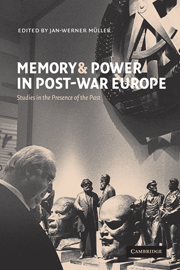Book contents
- Frontmatter
- Contents
- List of contributors
- Acknowledgements
- Introduction: the power of memory, the memory of power and the power over memory
- Part 1 Myth, memory and analogy in foreign policy
- 1 Memory of sovereignty and sovereignty over memory: Poland, Lithuania and Ukraine, 1939–1999
- 2 Myth, memory and policy in France since 1945
- 3 The power of memory and memories of power: the cultural parameters of German foreign policy-making since 1945
- 4 The past in the present: British imperial memories and the European question
- 5 Europe's post-Cold War remembrance of Russia: cui bono?
- 6 Memory, the media and NATO: information intervention in Bosnia-Hercegovina
- Part 2 Memory and power in domestic affairs
- Index
4 - The past in the present: British imperial memories and the European question
Published online by Cambridge University Press: 22 September 2009
- Frontmatter
- Contents
- List of contributors
- Acknowledgements
- Introduction: the power of memory, the memory of power and the power over memory
- Part 1 Myth, memory and analogy in foreign policy
- 1 Memory of sovereignty and sovereignty over memory: Poland, Lithuania and Ukraine, 1939–1999
- 2 Myth, memory and policy in France since 1945
- 3 The power of memory and memories of power: the cultural parameters of German foreign policy-making since 1945
- 4 The past in the present: British imperial memories and the European question
- 5 Europe's post-Cold War remembrance of Russia: cui bono?
- 6 Memory, the media and NATO: information intervention in Bosnia-Hercegovina
- Part 2 Memory and power in domestic affairs
- Index
Summary
In the second half of the twentieth century, Empire has been both remembered and portrayed by successive British governments as a positive phenomenon, despite a relentless decline in the British Empire's reach. Britain's imperial inheritance conveyed strong images of a seafaring nation with an effective global span and with great global responsibilities, of a stable monarchy and of a secure, legitimate and respected constitution. These memories have been closely inter-twined with heroism, and success in war in the twentieth century, as Britain, its empire and its dominions contributed to victory in two world wars. Received images of war promoted national British solidarity and emphasised the resilience of the British constitution as well triumph on the battlefield: these were truly memories of power. Such memories of power in turn contributed to enduring suspicions of post-war continental European supranational integration, a sense of superiority compared to other Europeans, and a notion that the United Kingdom's role in European international politics was still that of a balancer of other continental powers.
One facet of what has remained of Britain's post-imperial political culture is a deep craving for a leadership role, or to ‘punch above our weight’ as former Foreign Secretary Lord Hurd once put it. This has been important in the context of image projection at home and in continental Europe, as well as on the wider international stage.
- Type
- Chapter
- Information
- Memory and Power in Post-War EuropeStudies in the Presence of the Past, pp. 100 - 120Publisher: Cambridge University PressPrint publication year: 2002
- 11
- Cited by

